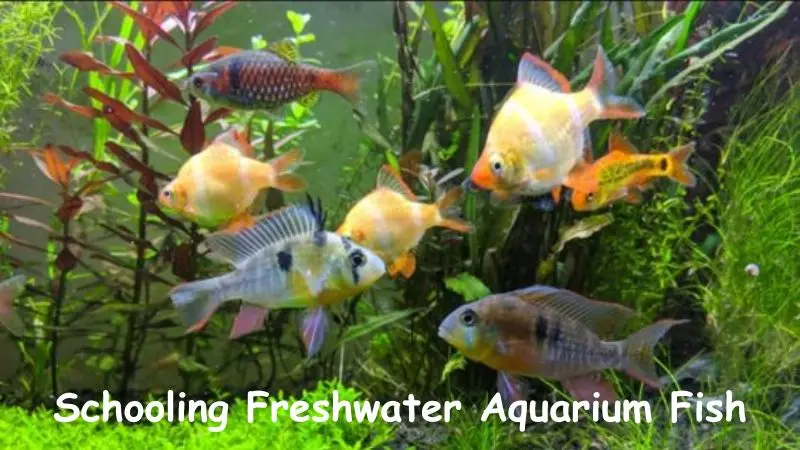fish diversity
Schooling Freshwater Aquarium Fish
The vibrant world of freshwater aquariums is a captivating microcosm of nature, offering a glimpse into the fascinating lives of aquatic creatures. Among the most captivating inhabitants are schooling fish, whose synchronized movements and social interactions create a mesmerizing spectacle.
Schooling Freshwater Aquarium Fish, as they are known, are not just visually appealing; they are also fascinating subjects for study, offering insights into the complex dynamics of animal behavior and the importance of social bonds.
This essay of fishtankmagic.com will delve into the fascinating world of schooling freshwater aquarium fish, exploring their natural behaviors, the factors that influence their schooling patterns, and the considerations for successfully keeping them in a home aquarium.
The Nature of Schooling Behavior
Schooling, a fundamental behavioral pattern observed in numerous fish species, is a complex phenomenon driven by a combination of instinctual and learned responses. It is more than just a random aggregation of individuals; it is a highly coordinated and synchronized movement that serves a variety of crucial functions for the fish.
Survival Advantages:
- Predator Avoidance: One of the primary benefits of schooling is enhanced predator avoidance. By forming a tightly packed group, individual fish reduce their chances of being singled out and attacked. The confusion created by a large, moving mass of fish can overwhelm predators, making it difficult for them to target specific individuals.
- Increased Foraging Efficiency: Schooling can improve foraging efficiency. When fish swim together, they can cover a larger area and detect prey more effectively. The collective effort of the group allows them to locate and access food sources that would be difficult to find individually.
- Enhanced Reproduction: Schooling can facilitate successful reproduction. By forming dense aggregations during spawning season, fish increase the chances of encountering potential mates and successfully releasing their eggs.
Social Benefits:
- Social Bonding: Schooling fosters strong social bonds among individuals. The constant interaction and synchronized movements create a sense of community and belonging. This social cohesion can be crucial for navigating complex environments and responding to threats.
- Information Sharing: Schooling allows fish to share information about food sources, potential dangers, and other environmental cues. This collective knowledge base can help the group make informed decisions and avoid potential hazards.
Factors Influencing Schooling:
The formation and maintenance of schools are influenced by a variety of factors, including:
- Species-Specific Behavior: Different fish species have distinct schooling patterns and preferences. Some fish form large, tightly packed schools, while others prefer smaller, more loosely organized groups.
- Environmental Conditions: Environmental factors such as water temperature, light intensity, and the availability of food can influence schooling behavior. For example, fish may form tighter schools in areas with high predator density or limited food resources.
- Individual Characteristics: Individual fish within a school may have different personalities and social hierarchies. These differences can influence their position within the school and their interactions with other members.
Selecting Schooling Freshwater Aquarium Fish
Choosing the right schooling freshwater aquarium fish for your home aquarium requires careful consideration of several factors:
- Tank Size: The size of your aquarium is a crucial factor in determining how many fish you can safely house. Schooling fish typically require a larger tank than solitary species, as they need ample space to swim and interact.
- Species Compatibility: Not all schooling fish are compatible with each other. Some species may be aggressive or territorial, while others may be peaceful and tolerant. Research the specific requirements and temperament of each species before introducing them to your aquarium.
- Water Parameters: Different fish species have different water parameter requirements, such as temperature, pH, and hardness. Ensure that the water parameters in your aquarium are suitable for the chosen species.
- Diet and Feeding: Schooling fish have varying dietary needs. Some are omnivores, while others are carnivores or herbivores. Choose fish with similar dietary requirements to ensure everyone gets adequate nutrition.
Creating a Thriving Schooling Environment
Once you have chosen your schooling fish, it is essential to create an environment that encourages their natural behaviors and promotes their well-being:
- Aquarium Size and Layout: Provide a spacious aquarium with ample swimming room. Include hiding places, such as caves, rocks, and plants, to create a sense of security and provide areas for individual fish to retreat when needed.
- Water Quality: Maintain excellent water quality by performing regular water changes and using a filter that is appropriate for the tank size and fish load.
- Lighting: Provide appropriate lighting for the chosen species. Some fish prefer dim lighting, while others require brighter conditions.
- Feeding: Feed your fish a varied diet that meets their specific nutritional needs. Offer high-quality flake food, frozen food, and live food as appropriate.
- Socialization: Introduce new fish gradually to minimize stress and allow them to acclimate to their new environment. Observe the fish closely for signs of aggression or stress, and adjust the stocking density if necessary.
Popular Schooling Freshwater Aquarium Fish
There are numerous fascinating schooling freshwater aquarium fish that can add vibrant life and movement to your tank. Here are a few popular examples:
- Neon Tetra (Paracheirodon innesi): These small, brightly colored fish are a classic choice for beginners. They form large schools and are known for their peaceful temperament.
- Cardinal Tetra (Paracheirodon axelrodi): Similar to neon tetras, cardinal tetras are peaceful and vibrant fish that form impressive schools. They prefer slightly cooler water temperatures than neon tetras.
- Black Skirt Tetra (Gymnocorymbus ternetzi): These unique fish have a distinctive, skirt-like fin that adds a dramatic touch to the aquarium. They are peaceful and tolerant of a variety of tank mates.
- Harlequin Rasbora (Trigonostigma heteromorpha): These small, colorful fish are known for their striking black and orange markings. They are peaceful and active, forming large schools.
- Rummy-Nose Tetra (Hemigrammus erythrozonus): These small, lively fish have a distinctive red spot on their nose. They are peaceful and form large schools, adding a splash of color to the aquarium.
- White Cloud Mountain Minnow (Tanichthys albonubes): These hardy fish are a good choice for beginners. They are relatively cold-tolerant and can thrive in a variety of water conditions.
- Zebra Danio (Danio rerio): These active and colorful fish are known for their distinctive stripes. They are peaceful and tolerant of a variety of tank mates.
- GloFish: These genetically modified zebrafish are available in a variety of vibrant colors. They are peaceful and active, forming large schools.
Conclusion
Schooling freshwater aquarium fish offer a unique and captivating addition to any home aquarium. Their synchronized movements and social interactions create a mesmerizing spectacle, while their natural behaviors provide insights into the fascinating world of aquatic life. By understanding the needs of these fish and providing them with a suitable environment, you can create a thriving community that will bring joy and wonder for years to come.
Remember that responsible fishkeeping involves careful research, proper care, and a commitment to providing a healthy and stimulating environment for your aquatic companions. By following the guidelines outlined in this essay, you can ensure that your schooling freshwater aquarium fish thrive and bring you years of enjoyment.












